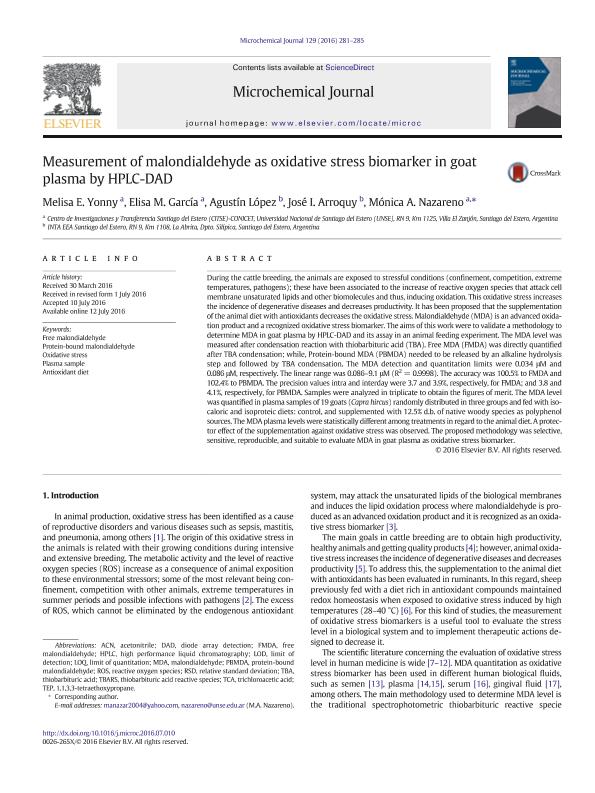Mostrar el registro sencillo del ítem
dc.contributor.author
Yonny, Melisa Evangelina

dc.contributor.author
García, Elisa Mariana

dc.contributor.author
Lopez, Agustin

dc.contributor.author
Arroquy, Jose Ignacio

dc.contributor.author
Nazareno, Mónica Azucena

dc.date.available
2020-09-17T16:37:53Z
dc.date.issued
2016-11
dc.identifier.citation
Yonny, Melisa Evangelina; García, Elisa Mariana; Lopez, Agustin; Arroquy, Jose Ignacio; Nazareno, Mónica Azucena; Measurement of malondialdehyde as oxidative stress biomarker in goat plasma by HPLC-DAD; Elsevier Science; Microchemical Journal; 129; 11-2016; 281-285
dc.identifier.issn
0026-265X
dc.identifier.uri
http://hdl.handle.net/11336/114211
dc.description.abstract
During the cattle breeding, the animals are exposed to stressful conditions (confinement, competition, extreme temperatures, pathogens); these have been associated to the increase of reactive oxygen species that attack cell membrane unsaturated lipids and other biomolecules and thus, inducing oxidation. This oxidative stress increases the incidence of degenerative diseases and decreases productivity. It has been proposed that the supplementation of the animal diet with antioxidants decreases the oxidative stress. Malondialdehyde (MDA) is an advanced oxidation product and a recognized oxidative stress biomarker. The aims of this work were to validate a methodology to determine MDA in goat plasma by HPLC-DAD and its assay in an animal feeding experiment. The MDA level was measured after condensation reaction with thiobarbituric acid (TBA). Free MDA (FMDA) was directly quantified after TBA condensation; while, Protein-bound MDA (PBMDA) needed to be released by an alkaline hydrolysis step and followed by TBA condensation. The MDA detection and quantitation limits were 0.034 μM and 0.086 μM, respectively. The linear range was 0.086–9.1 μM (R2 = 0.9998). The accuracy was 100.5% to FMDA and 102.4% to PBMDA. The precision values intra and interday were 3.7 and 3.9%, respectively, for FMDA; and 3.8 and 4.1%, respectively, for PBMDA. Samples were analyzed in triplicate to obtain the figures of merit. The MDA level was quantified in plasma samples of 19 goats (Capra hircus) randomly distributed in three groups and fed with isocaloric and isoproteic diets: control, and supplemented with 12.5% d.b. of native woody species as polyphenol sources. The MDA plasma levels were statistically different among treatments in regard to the animal diet. A protector effect of the supplementation against oxidative stress was observed. The proposed methodology was selective, sensitive, reproducible, and suitable to evaluate MDA in goat plasma as oxidative stress biomarker.
dc.format
application/pdf
dc.language.iso
eng
dc.publisher
Elsevier Science

dc.rights
info:eu-repo/semantics/openAccess
dc.rights.uri
https://creativecommons.org/licenses/by-nc-sa/2.5/ar/
dc.subject
ANTIOXIDANT DIET
dc.subject
FREE MALONDIALDEHYDE
dc.subject
OXIDATIVE STRESS
dc.subject
PLASMA SAMPLE
dc.subject
PROTEIN-BOUND MALONDIALDEHYDE
dc.subject.classification
Química Analítica

dc.subject.classification
Ciencias Químicas

dc.subject.classification
CIENCIAS NATURALES Y EXACTAS

dc.subject.classification
Ganadería

dc.subject.classification
Producción Animal y Lechería

dc.subject.classification
CIENCIAS AGRÍCOLAS

dc.title
Measurement of malondialdehyde as oxidative stress biomarker in goat plasma by HPLC-DAD
dc.type
info:eu-repo/semantics/article
dc.type
info:ar-repo/semantics/artículo
dc.type
info:eu-repo/semantics/publishedVersion
dc.date.updated
2020-09-17T14:41:09Z
dc.journal.volume
129
dc.journal.pagination
281-285
dc.journal.pais
Países Bajos

dc.journal.ciudad
Amsterdam
dc.description.fil
Fil: Yonny, Melisa Evangelina. Consejo Nacional de Investigaciones Científicas y Técnicas. Centro de Investigaciones y Transferencia de Santiago del Estero. Universidad Nacional de Santiago del Estero. Centro de Investigaciones y Transferencia de Santiago del Estero; Argentina
dc.description.fil
Fil: García, Elisa Mariana. Consejo Nacional de Investigaciones Científicas y Técnicas. Centro de Investigaciones y Transferencia de Santiago del Estero. Universidad Nacional de Santiago del Estero. Centro de Investigaciones y Transferencia de Santiago del Estero; Argentina
dc.description.fil
Fil: Lopez, Agustin. Instituto Nacional de Tecnología Agropecuaria. Centro Regional Tucumán-Santiago del Estero. Estación Experimental Agropecuaria Santiago del Estero; Argentina. Consejo Nacional de Investigaciones Científicas y Técnicas; Argentina
dc.description.fil
Fil: Arroquy, Jose Ignacio. Instituto Nacional de Tecnología Agropecuaria. Centro Regional Tucumán-Santiago del Estero. Estación Experimental Agropecuaria Santiago del Estero; Argentina. Consejo Nacional de Investigaciones Científicas y Técnicas; Argentina
dc.description.fil
Fil: Nazareno, Mónica Azucena. Consejo Nacional de Investigaciones Científicas y Técnicas. Centro de Investigaciones y Transferencia de Santiago del Estero. Universidad Nacional de Santiago del Estero. Centro de Investigaciones y Transferencia de Santiago del Estero; Argentina
dc.journal.title
Microchemical Journal

dc.relation.alternativeid
info:eu-repo/semantics/altIdentifier/url/http://www.sciencedirect.com/science/article/pii/S0026265X16301734
dc.relation.alternativeid
info:eu-repo/semantics/altIdentifier/doi/http://dx.doi.org/10.1016/j.microc.2016.07.010
Archivos asociados
